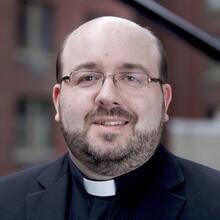A Reflection for Good Friday
But he was pierced for our offenses,
crushed for our sins;
upon him was the chastisement that makes us whole,
by his stripes we were healed. (Is 53:5)
For years, since first encountering it, I have made it a point to read and pray with Denise Levertov’s poem “On a Theme from Julian’s Chapter XX” on Good Friday. (If you’re not yet familiar with Levertov, here’s an appreciation America published in 2014; when I was interviewed on our Jesuitical podcast in 2020 about clericalism, Levertov was who I “canonized” at the end of my interview, around minute 39 of the episode.)
The Julian referenced in the poem’s title is Julian of Norwich, the great medieval English mystic. Julian’s writings, now published under the title Revelations of Divine Love, are the earliest surviving work in English written by a woman, and they record her visions, or “shewings” of the Passion of Christ. In Chapter XX, Julian writes that she saw that Jesus on the Cross suffered “more pain” than all other humans, “from the first beginning to the last day.” And Levertov was determined to wrestle, in her starkly beautiful poem, with what that could mean.
Reading Isaiah on Good Friday poses this question of Jesus’ involvement in our sufferings, in the sufferings of all human beings from the first beginning to the last day. As Isaiah says in reference to the Suffering Servant, it is “our pain that he bore, our sufferings he endured” (Is 53:4). And we wrestle with this liturgically on Good Friday by embracing and venerating the Cross, uniting ourselves in that way to Jesus’ suffering and sacrifice on the Cross on the one day of the liturgical year when we do not see that sacrifice made present in the offering of the Mass.
And if I’m being honest, the wrestling in poetic and liturgical encounter usually feels more meaningful, more forthright about how deep this mystery is, than theologizing about it or trying to explain it in preaching or writing. Yet here I am, making the attempt. If this turns out not to be helpful, you have the remedy: Read Levertov. Read Julian. Go to church and venerate the Cross tonight.
Through that union with Jesus’ suffering, may our own hearts be opened, as Jesus’ was and is, to the love which saves us.
One way of explaining Jesus’ relation to our suffering is to say that he suffered somehow in place of us, a set of ideas broadly described as “substitutionary atonement.” But that is not the approach Julian and Levertov take with her vision of Jesus suffering such profound pain.
Instead, Levertov asks “Why single out this agony?” and reminds us that there are other pains—children in hospital beds, the torment of the oppressed, “torture then, torture now”—that are at least as painful themselves. In blunt and almost brutal verse, she reminds us that crucifixion is a means of torture and that Good Friday is an encounter with an execution, and that crucifying Jesus did not mark an end to human beings’ degradation of each other.
But following Julian, Levertov sees that it is not Jesus’ suffering instead of us that makes his suffering redemptive, but rather Jesus’ union with God and with us that is transformative: “The oneing, she saw, the oneing/with the Godhead opened him utterly/to the pain of all minds, all bodies …”
And so the meditation Levertov offers us at the end of the poem, quoting Julian in her last lines, can also serve as an invitation on Good Friday into the way Jesus loves us on the Cross,
through those hours when he took to Himself
the sum total of anguish and drank
even the lees of that cup:
within the mesh of the web, Himself
woven within it, yet seeing it,
seeing it whole. Every sorrow and desolation
He saw, and sorrowed in kinship.
And through that union with Jesus’ suffering, may our own hearts be opened, as Jesus’ was and is, to the love which saves us.








